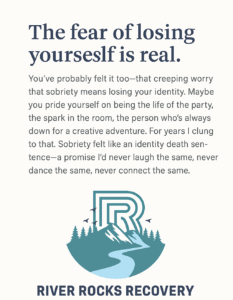I didn’t hit a dramatic rock bottom. I hit a quiet one—a slow, creeping realization that the version of myself I thought I was protecting was slipping away. For a long time, I wasn’t ready for alcohol rehab treatment. Then one day, I was.
The Fear of Losing Yourself Is Real
You’ve probably felt it, too—that creeping worry that sobriety means losing your identity. Maybe you pride yourself on being the life of the party, the spark in the room, the person who’s always down for a creative adventure. For years I clung to that. Sobriety felt like an identity death sentence—a promise I’d never laugh the same, never dance the same, never connect the same.
I learned this: fear isn’t a dealbreaker—it’s a signal. If you’re afraid sobriety will change you, it means you have something worth saving. That’s not weakness. That’s care.
Quiet Moments Over Loud Crashes
Most stories start with arrests or interventions. Mine started at dusk, over a half-finished drawing. I caught myself holding the pencil the same way I always did, but the line wasn’t flowing. The spark was gone—not because I’d lost talent, but because I’d lost clarity. I asked myself, “When did I stop wanting to create for me?” That question changed everything.
When you think about rehab, you picture chaos—a crisis. But for me, rehab began in stillness. That stillness helped me see the emptiness alcohol had carved out. That moment didn’t feel like a crisis. It was quieter, but it changed the direction of my life.
Saying Yes Before You Feel Ready
“Are you ready?” they asked. I lied. I said yes before I felt anything close to ready, because “ready” felt like a bit of magic I didn’t want to wait for. I said yes because the alternative—continuing the slow fade—felt scarier.
This is the truth: readiness isn’t a light switch. It’s a dimmer. One day, a whisper. The next, a voice. Rehab isn’t something you have to be 100% ready for. It’s something you move toward, even when “ready” feels like it’s just beyond reach.
Alcohol Rehab Treatment Helped Me Rebuild, Not Replace, Myself
I ended up at River Rocks Recovery in Middletown, Ohio. The twist? I didn’t go in feeling like I was broken. I showed up curious, scared, protective of who I was—and they met me there.
What Being Met “There” Actually Felt Like
- There was no wiping of identity. My history, my quirks, my creative fire—they weren’t erased, they were welcomed.
- There was structure, not suffocation. Therapy, group time, creativity, rest—it all felt purposeful, not punitive.
- There was clarity over chaos. For the first time in years, I saw how alcohol had blurred my edges, softened my voice.
This wasn’t about rewriting my story. It was about giving the story I already had a clearer voice, sharper colors, fuller connection with others.
Sobriety Didn’t Make Me Boring—It Made Me Real Again
Pre-rehab-me probably thought sobriety would flatten life. That’s how I sold it—to myself and others. But here’s what happened instead:
- I didn’t lose friends—I met people who saw me.
- I didn’t go silent—I found a truer voice.
- I didn’t lose creativity—I gained control over it.
Some days felt small. But most days felt… expansive. Wide. Like I’d taken down the fogged lens I didn’t realize I was wearing. Sudden moments of inspiration returned, and I listened.
You’re Allowed to Protect Who You Are
That voice in your head that says sobriety will change you? It’s protective, not rejecting. It’s the part of you that still cares about who you are. Good treatment options, like the alcohol rehab treatment program at River Rocks Recovery get that.
Sobriety isn’t about rewriting your identity. It’s about recovering it. About stripping away what you don’t need until you’re left with baseline you—which often turns out to be even stronger, more vibrant, more real than before.
Creativity as a Compass, Not a Crutch
I used creativity to survive the world. But then it became part of the survival story itself. In rehab, workshops and expressive therapy helped me separate creation from coping.
- I learned I could face discomfort without acting it out.
- I discovered new ways to process emotions—writing, collage, collage with found objects.
- I started making again—for the joy of it, not relief.
My sketchbook turned into a map. Each scratch, each hue, each unfinished whisper of an idea told me: clarity, not chaos, is my creative foundation.
Steps That Helped Me Say “Yes” on Day One
A few small things helped me actually step into treatment:
- One real conversation. A friend said, “You deserve more of yourself.” That line stayed.
- A visit to the website. Exploring what River Rocks Recovery offered—therapy, peer support, activities—helped me imagine myself there.
- A quiet moment. After a long day, I realized I was choosing alcohol over something I loved—sketching, connecting, being present.
You don’t need a billboard crisis to say yes. You just need a moment that matters. That whisper that says, something’s shifting.
What Comes After Saying “Yes”
Treatment isn’t an endpoint. It’s a launching pad. Here’s what showing up began to look like for me:
- Therapy sessions. Not “what’s wrong with you,” but “what’s alive in you.” We explored grief, parts that needed protecting.
- Group support. I met other creators, other identity-focused people, who thought sobriety would shrink them too.
- Creative workshops. I had time and safety to play—no expectations attached.
- Skill-building. Tools for anxiety, cravings, emotional regulation—all skills I now use to protect my creative life instead of numbing it.
A Metaphor to Remember
Imagine your identity is a stained-glass window. Alcohol darkened it. One day, you go to rehab and start cleaning it—piece by piece, pane by pane. Some sections shine instantly. Others take time. But slowly, day after day, light begins to pass through. And that light isn’t new—it was always there. You just needed clarity to let it in.
You Don’t Have to Wait for Rock Bottom
Mainstream stories talk about prison, car crashes, jail cells. But I’ve come to believe the real bottom is the moment you stop recognizing your reflection. The moment you realize you’re hiding, coping, shrinking. That doesn’t look dramatic—but it hurts deep.
You can say yes before it gets loud. You can say yes when your fear is strongest. When you finally reach for help, it’s not a defeat. It’s a beginning.
FAQs: What You Might Ask
1. Will alcohol rehab treatment erase who I am?
No. It supports your essence. You don’t get erased—you get refined. The goal isn’t change—it’s clarity.
2. What if I don’t feel broken enough?
Treatment isn’t only for crises. It’s also for preventative care—for people who sense the cracks and want to build a stronger foundation.
3. What kind of help will I get at River Rocks Recovery in Middletown, Ohio?
You’ll find therapy (individual, group), creative expression options, peer support, relapse prevention tools—all built around respect for your identity and creativity.
4. How long do I need to stay?
Programs vary. River Rocks offers flexible options—from short-term stays to longer residential programming. You work with clinicians to find what fits your needs.
5. Will people understand my fear of changing too much?
Yes. This fear is common, especially among creatives and identity-focused people. Treatment at River Rocks includes spaces to talk about identity, loss, fear—and to celebrate rediscovery.
6. What if I go to treatment and don’t like it?
Many places offer tours, pre-admission calls, or drop-in visits. You can try the vibe—you don’t have to commit blindly. Trust your gut and the structure they offer.
Reclaim Your Light
If you’re reading this and feel that quiet wondering—“What if I said yes?”—please know: that thought matters. That hesitation is not a stop sign. It’s a light flashing “look here.”
Treatment helped me peel back the layers I’d built to protect myself—outside the world’s pain, inside my own. I found myself again—not someone new, but someone remembered.
If you’ve been waiting for permission to say yes, this is it. You don’t have to lose yourself to find yourself. And you don’t have to wait.
Call (888) 905-6281 to learn more about our alcohol rehab treatment services in Middletown, Ohio.





























